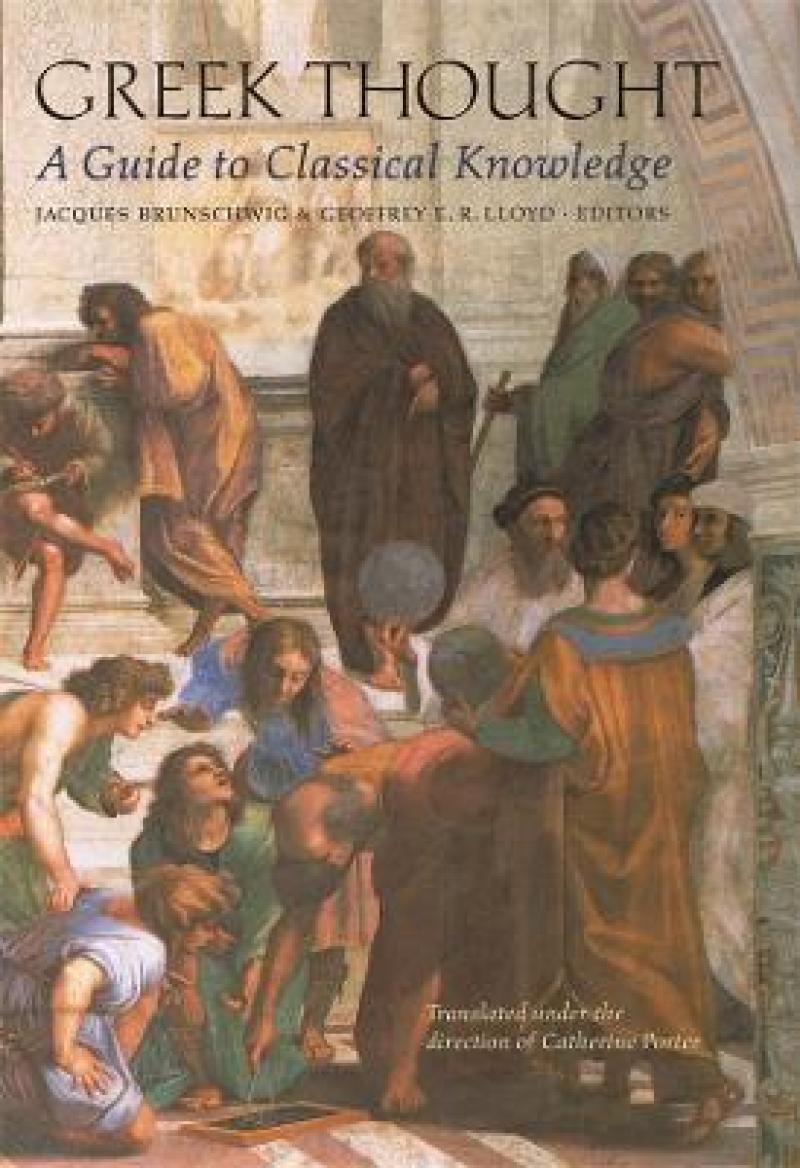Rather than analyzing Greek philosophy, politics, and science and discussing their influence on contemporary Western society, the authors have instead chosen to look at how the ancient Greeks perceived themselves and the world around them as well as how they reacted to that world...Given the superb quality of the scholarship and the very reasonable price for a volume of this length, this book should be a priority purchase.
Library Journal
More colloquy than compendium, this remarkable volume shows scholars shining as teachers. Ingeniously, editors Brunschwig and Lloyd have lured contributors into lively reflections...Readers encounter impassioned argument about 'the invention of politics' and truthfulness in history--ideal for undergraduates seeking context for their study of primary texts...The collection...holds delights...This is an edition you should order immediately.
- P. W. Wakefield, Choice
<i>Greek Thought</i> has been compiled to capture the sheer intellectual exhilaration of Greek thought--to introduce its readers to that certain intensity of life among the Greeks which flourished because of their way of thinking about the world, and to suggest that this way of life should be no more confined to the study now than it was then. As such, the book is by no means a typical reference work. In particular (despite its subtitle) it is not a guide to what the Greeks knew on any given subject, nor to all the theories of the major figures in the history of Greek thought. Rather, it deals with why the Greeks thought it important to know things and to examine any claims to knowledge--often their own as much as anybody else's...The authors assembled by the editors to produce these essays are all internationally respected in their disciplines. They were given free rein, within the aims of the book as a whole, to focus on what they considered important in each topic or author...one of the virtues of the book is that at the end of each essay there is a list of related articles elsewhere in the volume (in the case of "Medicine," there are nine) so a reader interested in the subject is not left with a mistaken impression that there is a consensus of opinion in disputed areas. In the attempt to introduce non-specialists to an understanding of the importance of Greek thought, the authors do not fall into the trap of distorting that thought through over-simplification...The book wasn't produced to make readers into philosophers, but it does, I think, show to readers who aren't afraid of some challenging material what was so invigorating about <i>Greek Thought</i> and how such thinking still today can deepen the texture of life.
- Lesley Dean-Jones, Washington Times
<i>Greek Thought</i> is a fascinating book. It is beautifully printed, bound, and illustrated; and it is a tribute to contemporary French ways of thinking about the Greeks...In both their alikeness to us and in their difference, the ancient Greeks have much to teach us. This encyclopedic book will help them do so.
- Michael Payne, Sunbury Item
"Greek knowledge" here represents all the sciences, liberal and otherwise, in a unique way by giving an analysis of how the Greeks saw themselves rather than attempting a complete account of Greek civilization. The more than 60 essays written by an international team of scholars provide portraits of significant scientists such as Archimedes and Ptolomy, philosophers such as Aristotle and Plato, alongside the historians Herodotus, Thucydides, and Polybius.
Translation Review
Ancient Greek thought is the essential wellspring from which the intellectual, ethical, and political civilization of the West draws and to which, even today, we repeatedly return. In more than sixty essays by an international team of scholars, this volume explores the full breadth and reach of Greek thought--investigating what the Greeks knew as well as what they thought about what they knew, and what they believed, invented, and understood about the conditions and possibilities of knowing. Calling attention to the characteristic reflexivity of Greek thought, the analysis in this book reminds us of what our own reflections owe to theirs.
In sections devoted to philosophy, politics, the pursuit of knowledge, major thinkers, and schools of thought, this work shows us the Greeks looking at themselves, establishing the terms for understanding life, language, production, and action. The authors evoke not history, but the stories the Greeks told themselves about history; not their poetry, but their poetics; not their speeches, but their rhetoric. Essays that survey political, scientific, and philosophical ideas, such as those on Utopia and the Critique of Politics, Observation and Research, and Ethics; others on specific fields from Astronomy and History to Mathematics and Medicine; new perspectives on major figures, from Anaxagoras to Zeno of Elea; studies of core traditions from the Milesians to the various versions of Platonism: together these offer a sense of the unquenchable thirst for knowledge that marked Greek civilization--and that Aristotle considered a natural and universal trait of humankind. With thirty-two pages of color illustrations, this work conveys the splendor and vitality of the Greek intellectual adventure.
